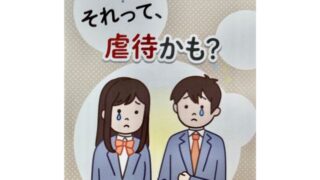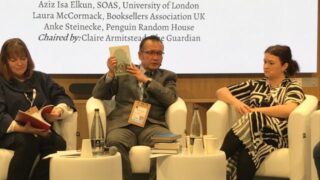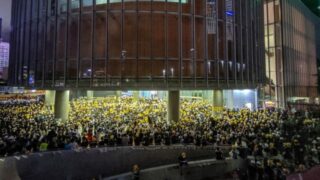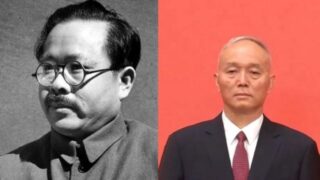A supplemental submission has been filed before the Human Rights Council.
by Massimo Introvigne


The United Nations Human Rights Committee is the body that monitors the implementation of the International Covenant on Civil and Political Rights (ICCPR) by the states parties. From October 10 to November 4, 2022, it is holding its 136th session in Geneva. Among the countries whose compliance with the ICCPR is examined in this session is Japan.
Among the documents submitted by NGOs in consultative status with the ECOSOC, the United Nations Economic and Social Council, being discussed in the session, one was filed by CAP-LC (Coordination des Associations et des Particuliers pour la Liberté de Conscience, Coordination of Associations and Individuals for Freedom of Conscience). It deals with the violations of the ICCPR in Japan perpetrated against the Unification Church, now known as the Family Federation for World Peace and Unification, after the assassination of former Prime Minister Shinzo Abe, a theme discussed at length in a series of Bitter Winter articles.
Abe was killed by a man who had never been a member of the Unification Church. His mother went bankrupt twenty years ago, and he blamed it on her excessive donations to that church. He decided to punish Abe since the former Prime Minister had attended via video an event of an organization connected with the Unification Church, and sent a message to another. The assassin had also planned to kill the leader of the Unification Church, which was clearly the victim in this incident, together with Abe.
However, there is an organized opposition to the Unification Church in Japan, and it managed to persuade the public opinion that the religious group was somewhat responsible for the homicide. The twisted logic was that, had his mother not donated to the Unification Church and gone bankrupt (in 2002), the assassin would not have killed Abe (in 2022).
Since the filing of the first CAP-LC submission to the HRC, violations of the human rights of the Unification Church/Family Federation have continued in Japan. CAP-LC has now filed a supplemental submission, where it notes that “the situation is getting worse.”
The first part of the submission is devoted to the so-called Expert Committee of the Consumer Affairs Agency convened by the Minister of Consumer Affairs, Mr. Taro Kono, which has now started its work. One of the eight members of the committee is Mr. Masai Kito, a prominent member of the anti-Unification-Church National Network of Lawyers Against Spiritual Sales—and, CAP-LC notes, “one of the attorneys who in the past have represented ‘deprogrammers’ engaged in the illegal activity of kidnapping and detaining adult members of the Unification Church for the purpose of forcibly ‘de-converting’ them from their religion.” On the other hand, the committee has no scholars of religion among its members.


CAP-LC argues that “opponents are using the committee as a tool to promote a ‘final solution’ of the Unification Church issue, if necessary by appointing a state minister who will be in charge of a definitive crackdown.” The submission describes three strategies used to achieve this aim.
The first is to call for an order of dissolution of the Unification Church/Family Federation, even if “neither the Unification Church/Family Federation as such nor any of its national leaders have been convicted of any crime.”
Second, the committee plans to propose law amendments to restrict “unjust donations to religious corporations.” Committee member Shiori Kanno explained that amending the laws on donations is necessary to distinguish “decent religious corporations” from those that are not “decent.” “Based on its several decades of advocacy for freedom of religion or belief, the statement explains, CAP-LC has learned that invariably vague language opens the door to discrimination. According to what standards would Japanese authorities decide which religions are ‘decent’ or otherwise? What does exactly mean that a religion is ‘decent’? Are administrative authorities competent to pass judgement on religions?”
Reportedly, the committee plans to prohibit “demanding donations by playing on the spiritual fears of followers and demanding donations when an individual is unable to make a rational decision.” CAP-LC comments that “the notion of ‘rational decision’ is vague. If the donor is mentally incapacitated, donations are already void under Japanese law. If the donors are mentally competent, calling their decision ‘irrational’ either refers to the discredited and pseudo-scientific theory of brainwashing, or is a case of begging the question by implying that all donations to a ‘non-decent’ religion are by definition irrational.”
As for the “spiritual fears of followers,” CAP-LC notes that “the fear of losing eternal salvation is a constitutive part of monotheistic religions” and is found in other religions as well. “This is certainly not a unique feature of the Unification Church, and legislating against those who preach the healthiness of spiritual fear would mean legislating against most religions.”
“One question that is never asked, adds CAP-LC, is for what purposes are the donations used. The question is not irrelevant. Media and opponents imply that donations to the Unification Church simply make its leaders rich, a century-old stereotype of anti-religious controversy. In fact, money collected in Japan has also been used extensively for a variety of philanthropic purposes, including the construction, fitting out and maintenance of a hospital in Tokyo, relief for tsunami and earthquake victims in Japan, medical clinics in Africa, as well as a host of other charitable ventures.”
The third tool used against the Unification Church is “to claim that parents raising second-generation children in the church’s faith are guilty of ‘child abuse.’” “As evidence, CAP-LC reports, one case of a second-generation member who attributed a depression to the parents’ involvement in the Unification Church has been mentioned, together with instances where parents were allegedly so busy with church activities that they neglected their children. Other Unification Church parents were accused of interfering in the romantic life of their daughters and sons.”
CAP-LC objects that “‘child abuse’ is a very specific legal category that refers to physical or sexual violence. Obviously, being too busy with their jobs or other activities, or trying to control the romantic relationships of their children, are frequent complaints sons and daughters raise against their parents—but, even when they have a factual basis, they do not amount to ‘child abuse.’ The implication in the case of the Unification Church is that socializing children into a ‘non-decent’ religion automatically amounts to ‘child abuse.’ Clearly, this argument can be used against any unpopular religious minority.”
In fact, CAP-LC notes that “other religions are becoming aware of this, and concerned about the fact that Japan threatens not to respect its ICCPR obligations towards religious liberty.” “We regard it as very significant CAP-LC says, that our first submission to this Human Rights Committee about the discrimination against the Unification Church in Japan has been presented to its readers by AsiaNews, the official news agency of the Pontifical Institute for Foreign Missions.”


The second part of the new submission refers to the hotline launched by the Ministry of Consumer Affairs, where citizens can complain about the so-called “spiritual sales” and other objectionable practices by the Unification Church. The hotline should have functioned until September 30, but its operation has been extended indefinitely.
CAP-LC quotes data from the Ministry of Consumer Affairs and the Ministry of Justice that prove the discriminatory nature of the hotline.
“The first set of data, the submission explains, refers to complaints about so-called ‘spiritual’ sales; received by the Ministry between 2012 and 2021, both in general and with specific reference to the Unification Church/Family Federation.” These data show that “only a small percentage of the ‘spiritual sales’ complaints received by the Ministry concerned the Unification Church. In 2021, the percentage was 1.87%. […] In 2021 more than 98% of the complaints concerned groups other than the Unification Church/Family Federation.”
The data also confirm that “the measures the Unification Church took to make sure that its members understood the existing laws and complied with them, rather than being merely cosmetic as the opponents maintain, have been remarkably effective. […] The complaints concerning the Unification Church continuously decreased, from 229 in 2012 to less than 100 since 2015 and less than 30 in 2021.”
Predictably, the hotline got more complaints in September 2022 after the Abe assassination and all the media campaigns against the Unification Church. Out of 1,952 complaints received from September 5 to 22, 1,317 were about the Unification Church. According to the government, 70% were about “money troubles,” and this should include the “spiritual sales.”
CAP-LC comments that “undergraduate students who conducted a survey with the methodology used for the hotline would rightly be ridiculed by their teachers. Not only does the hotline by definition create a self-selected sample but is easily open to manipulation by the enemies of the Unification Church. Furthermore, there is no means to verify whether those who call the hotline are who they say they are, or whether their complaints are true, exaggerated, or merely made up.”
Even so, the government reports “that 7.5% of those who called claimed to be members of the religious movement they criticized, 24% said they were ex-members, and the rest, i.e., the majority of the callers, identified themselves as relatives or friends or just concerned citizens. Also, 65% of the complaints mentioned incidents that happened more than 10 years ago or did not specify a date.”
CAP-LC concludes that “calls to the hotline do not prove anything, except that a witch hunt against the Unification Church, which is given no means in the course of the committee’s procedure to defend itself, is taking place in Japan, ignoring the fact that the Ministry’s own data prove that the number of complaints about ‘spiritual sales’ in general overwhelmingly concerned groups other than the Unification Church, and that the latter had taken effective measures leading to a substantial decrease of the cases throughout the years.”


The supplemental submission also adds new cases of violence and discrimination about members of the Unification Church/Family Federation, including members of the Women’s Federation for World Peace International (WFWP), an organization founded by the leader of the Unification Church/Family Federation, Ms. Hak Ja Han Moon, which is in general consultative status with the UN ECOSOC. “These incidents, CAP-LC comments, are particularly disturbing because they add a gender element and discriminate against a group whose aim is to promote women internationally, and whose good work has been repeatedly acknowledged by the United Nations.”
“The witnesses we interviewed, reports CAP-LC, feel strongly that the government is not effectively protecting their rights. One of the slanderers on social media is the same attorney Masai Kito who is a member of the Ministry of Consumer Affairs’ committee. According to the abused women of the WFWP, the attitude of the government suggests it has more sympathy for the slanderers and for those committing acts of discrimination than for the victims.”
CAP-LC concludes that “most unfortunately, every day the situation in Japan becomes worse. The hysteria about the Unification Church/Family Federation is breaching the protective walls erected by the ICCPR to protect human rights and freedom of religion or belief in Japan.”
As a signatory of the ICCPR, it is now time for Japan to face international scrutiny.









